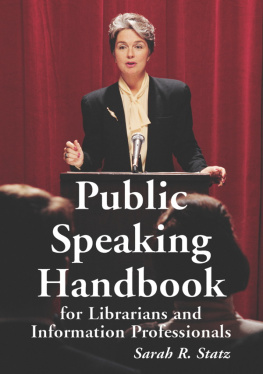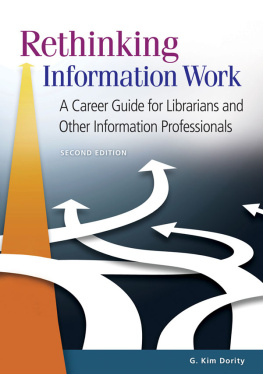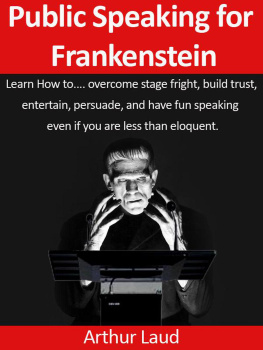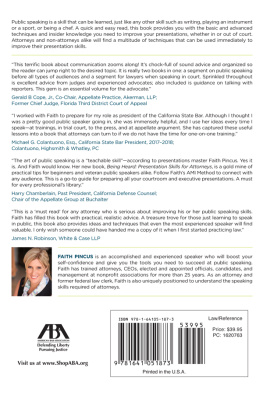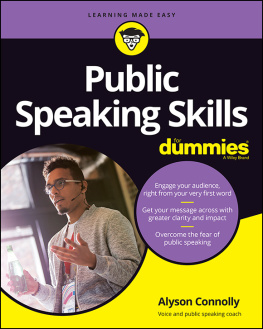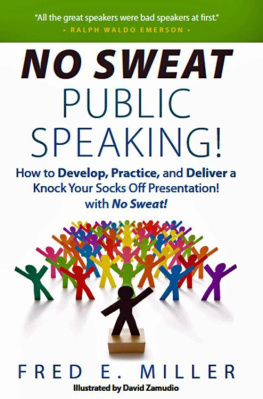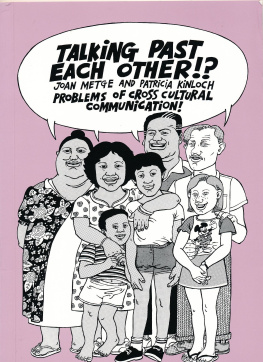
Table of Contents
LIBRARY OF CONGRESS CATALOGUING-IN-PUBLICATION DATA
Statz, Sarah R., 1974
Public speaking handbook for librarians and information professionals / Sarah R. Statz.
p. cm.
Includes bibliographical references and index.
ISBN 0-7864-1546-0
1. Communication in library scienceHandbooks, manuals, etc. 2. Public speakingHandbooks, manuals, etc. I. Title.
Z716.3.S73 2003
808.5'1'088092dc21 2003009930
British Library cataloguing data are available
2003 Sarah R. Statz. All rights reserved
No part of this book may be reproduced or transmitted in any form or by any means, electronic or mechanical, including photocopying or recording, or by any information storage and retrieval system, without permission in writing from the publisher.
Cover photograph 2003 Comstock Images
McFarland & Company, Inc., Publishers
Box 611, Jefferson, North Carolina 28640
www.mcfarlandpub.com
For Kevin
Acknowledgments
Although I have been fortunate to know many fine librarians and information specialists, I would particularly like to thank those who kindly consented to be interviewed for this book: Amy Biddick Crull, Laura Moss Gottlieb, Dineen Grow, Lee Konrad, and Margie Navarre-Saaf. I am proud and happy to call them colleagues and friends, and feel that the transcripts of our interviews constitute the most valuable part of this book. And, I offer thanks to Richard Schwartz for proving again and again that circulation work may not be glamorous, but it can be hilarious (with the right co-worker), as well as beautiful, when its performed by a true professional such as himself.
I also would like to say thanks to my family (especially Marty) for their support, given not only when I was writing this book, but also when I was working the jobs its based on.
Last but not least, I would like to recognize my indebtedness to my sister, Marcy Ystenes, without whose editing skills and unfailing encouragement this book could never have been written.
Introduction
One of the core competencies for librarians today is communication skills.
Maggie Weaver, Reach Out through Technology: Make Your Point with Effective A/V
Can I have a copy of your script?
Those eight short words were once the bane of my teaching-librarian existence. I remember hearing them after I taught workshops, during campus-wide bibliographic instruction retreats, and at countless meetings held to address the challenges of teaching information literacy. The word script was pervasive and unavoidable. If your class went well, the other librarians wanted to see your script. If the library instruction coordinators office heard good things about your presentation, they wanted to see a copy of your script. When you went to meetings to discuss library workshops, committees were appointed to write and distribute scripts. It should come as no surprise that, when I finally broke down and revealed my shameful secret, I was very nearly excommunicated from the ranks of the few, the proud, the public services and bibliographic instruction librarians.
I never had a script. And (this is the clever bit) you dont need one either.
Ive confessed my secret to you because if youve read this far into a handbook on public speaking for librarians, it can be for one of only two reasons: either theres absolutely nothing else around to read, or (and I hope this is the one) you want to become a better public speaker. If that second one is indeed your reason, we have something in common. We share the belief that, as Peter Kenny put it in his public speaking handbook for engineers, with a modest degree of study it is possible to improve ones public speaking ability (Kenny 1982, 3). The only thing left to examine is, why do we want to improve our speaking ability?
The library profession is changing. When I say that, I dont mean technological changes (there will always be plenty of those, and theyll be heavily discussed in library research and journals); personnel changes (theyre there toomore paraprofessionals and support staff than ever before keep libraries running smoothly); or even demographic changes (that merely reflect the dynamic nature of our population and globalization in general). What I do mean is that librarians and information professionals can no longer be content to be the unseen collectors, classifiers, and guardians of information. We cant stop fulfilling those functions, but we must accept that telling our patrons about them, and publicizing them to our colleagues (both in the library and in our broader governing institutions) are an important part of doing them.
That assertion is echoed in the literature and statistics of our field. Cheryl LaGuardia, author of Teaching the New Library, has suggested that the new librarian spheres of expertise include: intelligence, curiosity, empathy, and good interpersonal skills (LaGuardia et al. 1996, 21). Michael Gordon Jackson, in Advances in Librarianship, argued that Technical competency is not enough; there are other computer services experts on campus who can usually program and set up networks much better than librarians can ever hope to do (Jackson 2000, 105). John Bertot and Charles McClure recently found that sixty-two percent of public libraries offer some kind of Internet training services to their patrons and to staff (Bertot and McClure 2000, 5). In addition to advertising our skills and teaching our patrons, we cant forget good old self-defense as motivation for bettering our speaking skills: librarian and author Anne Turner recognized that incentive when she stated that Every staff person at every level, from book shelvers to the director, needs to have good communication skills to handle the problems theyll confront in the library world (Turner 1993, 46).
So librarians and information professionals are doing more public speaking than ever beforeat conferences, in meetings, when teaching classes or giving book talks, and in countless other situations. But are we doing it well, and more importantly, are we enjoying ourselves while doing so? At least one research study would indicate that we probably are not; Mary Jane Scherdins fascinating 1992 study of 1,600 librarians who took the Myers-Briggs Type Indicator (MBTI) personality inventory found that librarians are the opposite of the general population on Introversion and Intuition, and a whopping sixty-three percent of librarians display introverted tendencies (as compared to thirty-five percent in the general population) (Scherdin 1994, 105). What does that really mean? Fortunately, we can turn to the creators of the MBTI, Isabel Briggs Myers and Peter B. Myers, for their explanation of what it means to be an introvert: Their dominant process is engrossed with the inner world of ideas, and the auxiliary process does what it can about their outer lives. Most people see only the side introverts present to the outer world, which is mostly their auxiliary process, their second best (Myers 1980, 1213). Put another way (and this is the way that is discussed to death in library literature), many librarians are shy, and think that they have an image problem, which only makes them more shy. Its an ugly cycle, and its one that would indicate that, although most people fear public speaking, librarians have even more reason to fear and dislike it.
It is my belief that our fear or dislike of public speaking is indicated not only by our obsession with our bookish and retiring image, but also by the complete and utter lack of any kind of resources addressing good speaking skills, written by us and for us. That void was noted by Danelle Hall (director of the Oklahoma City University Dulaney-Browne Library) as recently as May 2002: It is perhaps significant that the past three years of Library Literature turned up only a handful of articles on the subject of public speaking, and those were in journals such as Searcher, Emedia, and Computer Librarian (Hall 2002, 64).
Next page
